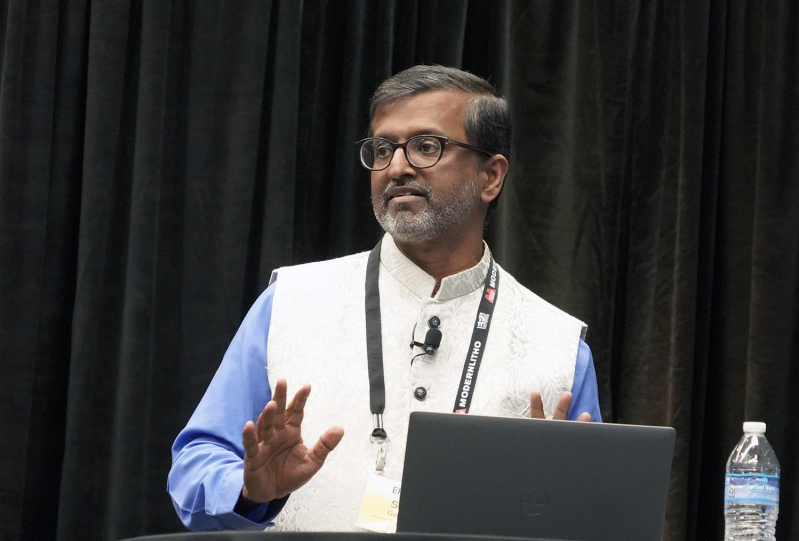
At a time when Christianity is growing most rapidly outside the West, evangelical writers must urgently reconsider their audience, said Sam George, a global missions scholar and Lausanne Movement leader, during a keynote address at the Evangelical Press Association’s annual convention on Monday.
“Begin to write and publish and make your resources available in Spanish,” George told attendees, highlighting that Spanish recently surpassed English as the world’s most spoken Christian language. “There’s a large readership—not in Spain, but in Latin and Central America. The world is reading us, even when we don’t realize it.”
Addressing some two hundred Christian editors, journalists and communicators gathered in Branson, Missouri, George emphasized that Christian publishing must reckon with the demographic transformation of the global church. In 1900, 82% of the world’s Christians lived in Europe and North America. Today, two-thirds are in Africa, Asia, and Latin America.
George, who was born in the Andaman Islands of India and now lives near Chicago, drew on his decades of experience in world Christianity and diaspora ministry. After a successful career in engineering and business, George pursued theological studies at Fuller and Princeton seminaries and later earned a Ph.D. from Liverpool Hope University focused on family, church, and diaspora dynamics. He currently serves on the leadership team of the Lausanne Movement and has traveled to 79 countries studying the spread and vitality of global Christianity.
“We are living in extraordinary times in the history of Christianity,” George said. “The church today looks more like the multitude in Revelation 7:9—drawn from every nation, tribe, people and language—than at any time before.”
The Global South’s Christian surge
Citing recent data, George noted that in 2025, Sub-Saharan Africa is home to roughly 754 million Christians, Latin America around 620 million, and Asia approximately 460 million—far exceeding North America’s 270 million. “At the current rate of growth, China may become the largest Christian country in the world by the end of this decade,” he added.
This massive shift has major implications for how Christian literature is produced, translated, and distributed. George encouraged EPA members to prepare their content with multilingual and multicultural audiences in mind.
“Maybe be mindful to know that one day your magazine, your publication, your resources will be read by people you never anticipated,” he said. “What we write and speak in English—how will it be translated into Mandarin, into Spanish, into Swahili?”
George, who speaks five languages, underscored how his own books have been translated into Mandarin. “I had to think: How will this sound in Chinese?” he recalled.
Global reversal of mission flows
Beyond shifting readership, George pointed to how traditional mission-sending patterns have reversed. Whereas Western nations once exported missionaries to the Global South, it is now common to see Christian leaders from Brazil, Nigeria, Korea, and China planting churches and sharing the gospel around the world—including in Europe and North America.
“The largest Assemblies of God church in the world is no longer in the U.S.—it’s in South Korea. The largest Methodist church is in Korea, and the largest Lutheran church is in Ethiopia,” he said. “Africans are now saving Europe by planting churches across London, Manchester, and Berlin. The churches they once colonized are now sending missionaries back.”
He added that the next Archbishop of Canterbury, spiritual head of the global Anglican Communion, may very well come from Africa, where Nigeria alone has more Anglicans than England, Scotland, Ireland, the U.S., and Australia combined.
Implications for evangelical publishing
While recognizing the significant concentration of financial resources in the West, George challenged evangelical publishers to partner with writers and designers from the Global South—especially as countries like India, Sri Lanka, and the Philippines develop vibrant Christian publishing industries.
“We should not fear that they’ll take our jobs,” he said. “Instead, we’re empowering and collaborating to create literature for the world.”
He pointed to the success of projects like The Purpose Driven Life by Rick Warren, which has been printed and distributed through major publishing efforts in Asia and Africa.
The shift, George said, is not just about language, but also about theology, ecclesiology, and discipleship models. He described how Christians in Africa, Asia, and Latin America often engage Scripture and community in ways that differ from Western Enlightenment traditions.
“Discipleship is not a curriculum,” he said. “It is life-on-life. In Asia, we understand discipleship relationally, not industrially. It’s not about mass-producing believers. It’s about transformation.”
A call for cultural humility and strategic vision
George’s closing charge to evangelical media professionals was both urgent and hopeful: embrace the new reality of a global church, and prepare for the future with humility and purpose.
“We need the Global South more than they need us,” he said. “They are helping save us from a narrow, parochial, nationalized understanding of our faith.”
He encouraged EPA members to adopt a long-term strategy through 2050, recognizing that evangelical content, once bound to North American audiences, will increasingly serve—and be shaped by—Christians around the globe.
“Keep the global Christian in the back of your mind,” George concluded. “As you frame your publications, your resources, your digital strategies—think not just about your neighborhood, but about Nairobi. Not just Tulsa, but Tokyo. Not just Wheaton, but the world.”






